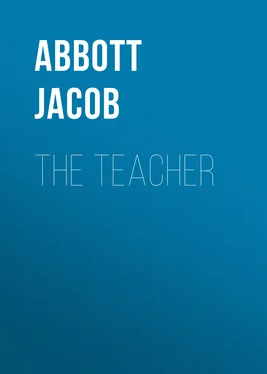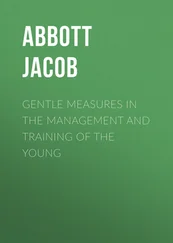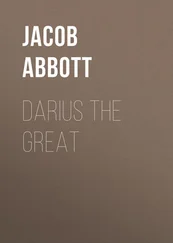Jacob Abbott - The Teacher
Здесь есть возможность читать онлайн «Jacob Abbott - The Teacher» — ознакомительный отрывок электронной книги совершенно бесплатно, а после прочтения отрывка купить полную версию. В некоторых случаях можно слушать аудио, скачать через торрент в формате fb2 и присутствует краткое содержание. Жанр: foreign_edu, pedagogy_book, на английском языке. Описание произведения, (предисловие) а так же отзывы посетителей доступны на портале библиотеки ЛибКат.
- Название:The Teacher
- Автор:
- Жанр:
- Год:неизвестен
- ISBN:нет данных
- Рейтинг книги:5 / 5. Голосов: 1
-
Избранное:Добавить в избранное
- Отзывы:
-
Ваша оценка:
- 100
- 1
- 2
- 3
- 4
- 5
The Teacher: краткое содержание, описание и аннотация
Предлагаем к чтению аннотацию, описание, краткое содержание или предисловие (зависит от того, что написал сам автор книги «The Teacher»). Если вы не нашли необходимую информацию о книге — напишите в комментариях, мы постараемся отыскать её.
The Teacher — читать онлайн ознакомительный отрывок
Ниже представлен текст книги, разбитый по страницам. Система сохранения места последней прочитанной страницы, позволяет с удобством читать онлайн бесплатно книгу «The Teacher», без необходимости каждый раз заново искать на чём Вы остановились. Поставьте закладку, и сможете в любой момент перейти на страницу, на которой закончили чтение.
Интервал:
Закладка:
Looking at an object to be accomplished, or an evil to be remedied, then studying its nature and extent, and devising and executing some means for effecting the purpose desired, is, in all cases, a source of pleasure; especially when, by the process, we bring to view or to operation, new powers, or powers heretofore hidden, whether they are our own powers, or those of objects upon which we act. Experimenting has a sort of magical fascination for all. Some do not like the trouble of making preparations, but all are eager to see the results. Contrive a new machine, and every body will be interested to witness, or to hear of its operation;—develope any heretofore unknown properties of matter, or secure some new useful effect, from laws which men have not hitherto employed for their purposes, and the interest of all around you will be excited to observe your results;—and especially, you will yourself take a deep and permanent pleasure, in guiding and controlling the power you have thus obtained.
This is peculiarly the case with experiments upon mind, or experiments for producing effects through the medium of voluntary acts of the human mind, so that the contriver must take into consideration the laws of mind in forming his plans. To illustrate this by rather a childish case: I once knew a boy who was employed by his father to remove all the loose small stones, which, from the peculiar nature of the ground, had accumulated in the road before the house. He was to take them up, and throw them over into the pasture, across the way. He soon got tired of picking them up one by one, and sat down upon the bank, to try to devise some better means of accomplishing his work. He at length conceived and adopted the following plan. He set up, in the pasture, a narrow board, for a target, or as boys would call it, a mark,—and then, collecting all the boys of the neighborhood, he proposed to them an amusement, which boys are always ready for,—firing at a mark. I need not say that the stores of ammunition in the street were soon exhausted; the boys working for their leader, when they supposed they were only finding amusement for themselves.
Here now, is experimenting upon the mind;—the production of useful effect with rapidity and ease, by the intervention of proper instrumentality;—the conversion, by means of a little knowledge of human nature, of that which would have otherwise been dull and fatiguing labor, into a most animating sport, giving pleasure to twenty, instead of tedious labor to one. Now the contrivance and execution of such plans is a source of positive pleasure; it is always pleasant to bring the properties and powers of matter into requisition to promote our designs,—but there is a far higher pleasure in controlling, and guiding, and moulding to our purpose the movements of mind.
It is this which gives interest to the plans and operation of human governments. They can do little by actual force. Nearly all the power that is held, even by the most despotic executive, must be based on an adroit management of the principles of human nature, so as to lead men voluntarily to cooperate with the ruler, in his plans. Even an army could not be got into battle, in many cases, without a most ingenious arrangement, by means of which half a dozen men can drive, literally drive, as many thousands, into the very face of danger and death. The difficulty of leading men to battle must have been for a long time a very perplexing one to generals. It was at last removed by the very simple expedient of creating a greater danger behind than there is before. Without ingenuity of contrivance like this,—turning one principle of human nature against another, and making it for the momentary interest of men to act in a given way, no government could stand a year.
I know of nothing which illustrates more perfectly the way by which a knowledge of human nature is to be turned to account in managing human minds, than a plan which was adopted for clearing the galleries of the British House of Commons, as it was described to me by a gentleman who had visited London. It is well known that the gallery is appropriated to spectators, and that it sometimes becomes necessary to order them to retire, when a vote is to be taken, or private business is to be transacted. When the officer in attendance was ordered to clear the gallery, it was sometimes found to be a very troublesome and slow operation; for those who first went out, remained obstinately as close to the doors as possible, so as to secure the opportunity to come in again first, when the doors should be re-opened. The consequence was, there was so great an accumulation around the doors outside, that it was almost impossible for the crowd to get out. The whole difficulty arose from the eager desire of every one to remain as near as possible to the door, through which they were to come back again . I have been told, that, notwithstanding the utmost efforts of the officers, fifteen minutes were sometimes consumed in effecting the object, when the order was given that the spectators should retire.
The whole difficulty was removed by a very simple plan. One door only was opened when the crowd was to retire, and they were then admitted through the other. The consequence was, that as soon as the order was given to clear the galleries, every one fled as fast as possible through the open door around to the one which was closed, so as to be ready to enter first, when that, in its turn, should be opened; this was usually in a few minutes, as the purpose for which the spectators were ordered to retire was usually simply to allow time for taking a vote. Here it will be seen that by the operation of a very simple plan, the very eagerness of the crowd to get back as soon as possible, which had been the sole cause of the difficulty , was turned to account most effectually to remove it. Before, they were so eager to return, that they crowded around the door so as to prevent others going out. But by this simple plan of ejecting them by one door, and admitting them by another, that very circumstance made them clear the passage at once, and hurried every one away into the lobby, the moment the command was given.
The planner of this scheme must have taken great pleasure in seeing its successful operation; though the officer who should go steadily on, endeavoring to remove the reluctant throng by dint of mere driving, might well have found his task unpleasant. But the exercise of ingenuity in studying the nature of the difficulty with which a man has to contend, and bringing in some antagonist principle of human nature to remove it, or if not an antagonist principle, a similar principle, operating, by a peculiar arrangement of circumstances, in an antagonist manner, is always pleasant. From this source a large share of the enjoyment which men find in the active pursuits of life, has its origin.
The teacher has the whole field, which this subject opens, fully before him. He has human nature to deal with, most directly. His whole work is experimenting upon mind; and the mind which is before him to be the subject of his operation, is exactly in the state to be most easily and pleasantly operated upon. The reason now why some teachers find their work delightful, and some find it wearisomeness and tedium itself, is that some do, and some do not take this view of their work. One instructer is like the engine-boy, turning without cessation or change, his everlasting stop-cock, in the same ceaseless, mechanical, and monotonous routine. Another is like the little workman in his brighter moments, fixing his invention and watching with delight its successful and easy accomplishment of his wishes. One is like the officer, driving by vociferations and threats, and demonstrations of violence, the spectators from the galleries. The other, like the shrewd contriver, who converts the very cause which was the whole ground of the difficulty, to a most successful and efficient means of its removal.
Читать дальшеИнтервал:
Закладка:
Похожие книги на «The Teacher»
Представляем Вашему вниманию похожие книги на «The Teacher» списком для выбора. Мы отобрали схожую по названию и смыслу литературу в надежде предоставить читателям больше вариантов отыскать новые, интересные, ещё непрочитанные произведения.
Обсуждение, отзывы о книге «The Teacher» и просто собственные мнения читателей. Оставьте ваши комментарии, напишите, что Вы думаете о произведении, его смысле или главных героях. Укажите что конкретно понравилось, а что нет, и почему Вы так считаете.












